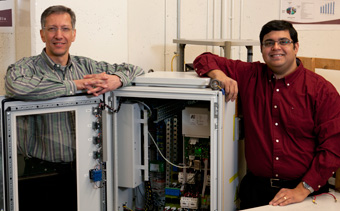Hybrid energy solutions
People in remote regions need reliable energy systems that can efficiently handle the needs of a few dozen homes and businesses.
Extending power lines from existing grids to remote communities in northern and rural areas is expensive. While smaller diesel generators are a more conventional option for supplying energy, diesel transport is also costly.
“The solution is a hybrid power system that maximizes renewable energy and relies minimally on diesel,” says Luiz Lopes, an associate professor in Concordia University’s Department of Electrical and Computer Engineering.

Lopes is one of three researchers in Concordia’s Power Electronics and Energy Research (PEER) Group developing hybrid electric systems to maximize efficiency while reducing greenhouse gases. He has been researching micro-grid systems since 2007 with support from Natural Resources Canada.
His fellow PEER researchers include Sheldon Williamson and Pragasen Pillay, the Natural Sciences and Engineering Research Council of Canada/Hydro-Québec Industrial Research Chair in Energy Efficiency in Electrical Machines for Small Scale Renewable Energy Production Systems.
With the support of a team of graduate students and technicians, the trio are optimizing fossil fuel-dependent generators and engines and adapting them to operate with more sustainable forms of energy. Their common research interests allow them to pool resources while focusing on particular problems.
For instance, Willamson is turning to batteries as a way to supplement diesel fuel supplies for standard engines. A decade ago, electric vehicles were rare and enthusiasm for them was limited. Williamson says this is no longer the case, and industry is paying attention.

“My students are hired by companies such as Chrysler and Bombardier before they finish school,” he says. “Both the aviation and rail industries are moving toward electric systems.”
Lopes responds to a different set of challenges in managing the energy needs of remote communities. Batteries are unsuitable options to store energy in the north since they require replacement and do not perform well in the cold.
While wind and solar energy can be harnessed easily enough, these sources are only available intermittently. The uneven availability of solar power increases the wear and tear on generators, which are taxed once the sun sets when no solar energy is collected.
“The challenge is to balance fluctuating supply with demand,” he says. Instead of designing systems to accumulate the supply, Lopes has focused on controlling the demand side of the equation. For instance, hot water tanks are programmed to draw energy when the sun is high, storing the heated water until it is needed when solar energy is unavailable.
“Sheldon is concerned with maximizing battery life,” explains Lopes. “My systems must be simple and automated, to reduce the need for servicing or replacement parts.”
By sharing methodologies through the PEER Group, the team can compare results to tailor solutions to specific problems.
Related link:
• Power Electronics and Energy Research Group